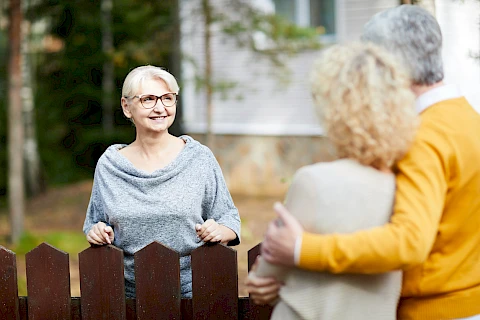
Social connections are vital for everyone, but especially for seniors. Strong neighborhood friendships can significantly improve their quality of life. However, some seniors may struggle to get out and connect with others around them. As a caregiver or loved one, you can offer essential support that makes it easier for seniors to make those vital connections.
The Benefits of Neighborhood Connections for Seniors
There are notable benefits to making friends in the neighborhood.
Emotional Well-Being: Reducing Loneliness and Depression
When seniors feel connected to their neighbors, it can alleviate feelings ofloneliness and depression. Emotional support from the community can make a significant difference in a senior's overall happiness.
Physical Health: Staying Active and Engaged
Social connections often encourage seniors to stay active. Whether it's a daily walk with a neighbor or joining a local fitness group, staying engaged can improve physical health.
Cognitive Benefits: Mental Stimulation Through Social Interaction
Engaging in conversations and activities with neighbors provides mental stimulation. This can help keep seniors' minds sharp and delay cognitive decline.
Facilitating Conversations
Initial conversations with someone new can be challenging. However, caregivers can often help their senior loved ones break down those barriers.
Tips for Starting Conversations with Neighbors
Encourage seniors to start with simple greetings when they see neighbors. A friendly "hello" or "good morning" can be the first step toward a lasting friendship.
Seniors should be encouraged to talk about their interests and hobbies. Whether it's gardening, reading, or playing a musical instrument, sharing these passions can help find common ground with neighbors. In addition, they can consider asking neighbors about their interests or families.
Role-Playing Scenarios to Build Confidence in Social Settings
Practice makes perfect. Role-playing different social scenarios can help seniors feel more confident when engaging with neighbors, especially if they suffer from shyness or anxiety. Caregivers can act out various situations, offering tips and encouragement.
Encouraging Community Involvement
In addition to simply encouraging conversations with neighbors, caregivers can take several steps to get seniors out in the community and encourage them to connect with others.
Identifying Local Events and Activities Suitable for Seniors
Look for neighborhood events and activities that are senior-friendly. This could include community fairs, local concerts, or library reading groups. Participating in these events can be a great way for seniors to meet new people.
Volunteering Opportunities in the Community
Volunteering is a wonderful way for seniors to stay active and give back to their community. Many local organizations welcome senior volunteers, and it's a great way for them to meet like-minded individuals.
Joining Clubs or Groups That Match the Senior's Interests
Identify clubs or groups that align with the senior's hobbies. This could be a gardening club, a book club, or even a knitting group. These gatherings offer regular opportunities for social interaction.
Leveraging Technology
Introduce seniors to social media platforms and community apps, where they can join local groups and stay updated on neighborhood events. These tools can help them stay connected even when they're at home.
Many online forums and groups cater specifically to seniors. Joining these can provide additional social opportunities and resources tailored to their needs.
Offer More Support to Seniors at Home
Helping seniors connect with their neighbors is crucial for their well-being. By fostering these connections, caregivers can make a positive impact on their lives. If your loved one lives in Union, Westfield, Morristown, Madison, and Morris County and needs more help at home, contact Senior Helpers Madison, NJ. Our team of in-home caregivers can go a long way toward decreasing senior loneliness and improving quality of life.